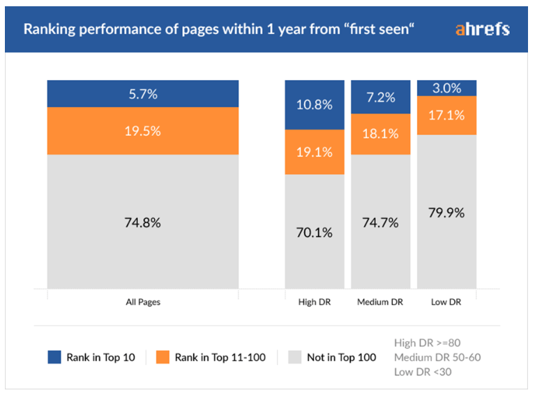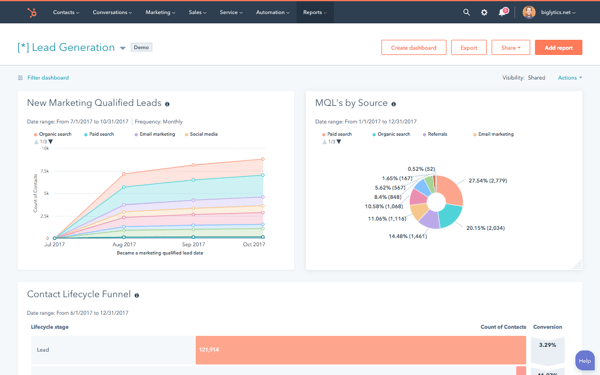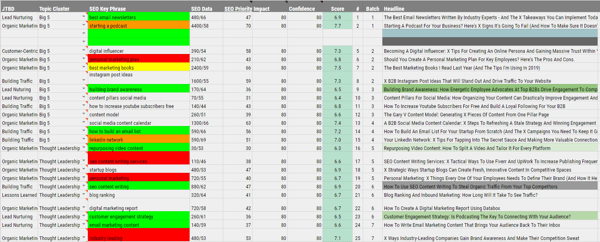Have you ever been told you could get your site to rank within three months?
That probably sounds amazing; so amazing you're tempted to pay for their services. But what happens at that three-month mark is always the same. Your site doesn't even make it to the first page of the SERPs.
And, if you somehow reached a top three spot for your generalized keywords, you can assume some black hat tricks were used and Google's hammer is going to slam your content back to where it belongs. But that's only if it's feeling merciful.
There are a lot of questions around content marketing that don't receive the truthful responses they deserve. We'll show you the top content marketing FAQs and be the honest broker who doesn't sugarcoat the truth.
Content Marketing FAQs to Uncover the Truth
With so many questions, and so many people selling their services, it's important to find someone who can share the truthful answers you need to hear.
It's unfortunate that some companies will offer lofty promises that can't be achieved, but with this list of frequently asked questions, you'll gain a better understanding of the baselines and what content marketing is actually capable of.
1. What is Content Marketing?
Content marketing is an Inbound approach to creating and distributing valuable, relevant content to attract a specific audience and drive customer interaction.
The difference between Inbound and Outbound marketing is how you start your relationship with your audience. With an Outbound approach, you're trying to grab their attention, whether that's through billboards, commercials, or other advertisements.
With Inbound marketing, you're creating content that the consumer is already searching for. They have a question and you're providing answers on your blog, social channels, and through video. The main difference is that you're not trying to snag their attention, you're trying to provide as much value as you can muster to entice them to engage with your brand.
That's the basis of customer-centric marketing, where you put their customer's needs as the primary focus. Once they've arrived at your brand, you offer more content to nurture them through the buyer's journey at their own pace.
2. Can My Business Do Content Marketing?
Any business can do content marketing. Though content marketing is more popular with B2B companies, it's still used by B2Cs. So whether you're an eCommerce store, a brick and mortar shop, or a SaaS company, there are ways content marketing can grow your audience and help you achieve results.
To start, you only need a blog, video channel, or a social media account. There's a lot more to building your strategy to maximize ROI, but as long as you're producing content, you're on your way.
3. How Long Until My Site is Number 1?
If your goal is immediate success (a top spot on Google's SERPs) you're looking in the wrong discipline of marketing.

Content marketing requires you to be in it for the long game. Only 5.7% of all newly published content gets to the top 10 of the rankings page in under 12 months.
With the right strategy, you can move your pages up faster than if you try haphazardly executing, but even the industry's most successful marketers aren't producing results immediately after publishing.
If you can make highly relevant content and target the right keywords, when your site reaches the top of the SERPs, it'll be more likely to stay and keep driving additional traffic to your site.
4. How Do I Generate Leads and Sales Without Human Interaction?
Ultimately, customers aren't interested in your product. They're interested in solving a problem, and your product is a method of doing it.
Content that's aligned to their problem and provides value towards solving it will encourage them to continue engaging with your brand. It's up to you to carve out the buyer's journey and the route you want them to take, but so long as you're giving them a logical next step in solving their problem, they'll stay with you.
5. Couldn't Educating My Customers Send Them to My Competition?
One of the hard parts of content marketing is understanding that not every potential customer is the right fit for your business. At the start of their journey, they're trying to gather information on their problem to figure out the best way to address it.
If you tailor your customer personas to the audience you're trying to target, you can increase the odds of appealing to the right traffic. By providing value and delivering on the reason they've come to your site, you can build trust, causing consumers to continue associating with your brand rather than the competition.
6. How Can I Build My Brand With Content Marketing?
Building a brand is challenging no matter how you approach it. With content marketing, however, you're able to create a consistent voice that differentiates you from the competition.
If you can identify your unique value proposition, apply it to a brand bible, load your content with usefulness, and distribute, your brand will quickly become recognizable within your industry.
7. How Do You Measure a Content Marketing Strategy's Success?
To measure success, you should start with your goals. Is your focus on increasing brand awareness? Is it converting more customers? Whatever you choose will decide which metrics matter most.
For example, if your goal is more sales, you'll want to track your total visitors, which offers are converting, and how many leads you've gained. That would give you insights to adapt your strategy for maximum potential.
8. How Much Does Content Marketing Cost?
Content marketing is one of the most scalable disciplines you can use. There's no bidding for ads or commercials. If you want to put the minimum amount down to see growth, you can do it. When you're ready to ramp up, you can do that too.
Cost for content marketing comes down to how aggressive you want to make your strategy.
If you're hiring out, you have a few options, but you'll have to budget for their time. Freelancers can be inexpensive, but they often aren't writing with the overall strategery of an agency. If you truly want to minimize the cost to your brand, in-house teams are a great option, but if your writers aren't professionals in the craft, you should establish quality checks.
9. How Do I Decide What Keywords to Rank For?
Topic clusters are themes your content will fall into. They're meant to be relevant to your industry so you can include all the related keywords under one umbrella. This increases the chances of search engines seeing your site as valuable.
Keywords should be based on what customers are actually searching for and related to questions they need answered. Once you have these terms listed, tools like SEMRush can show you the monthly search volume and how difficult it is to rank for that keyword.
10. How Can I Get Executives to Buy Into Content Marketing?
Content marketing is still a relatively new concept, and some older executives will want to stick with "the old fashioned way" because they're more comfortable with it.
By showing the research, content marketing case studies from within your industry, and best practices, you can increase the odds of them trying it out. Frame your discussion with realistic expectations, focused on long-term growth.
If they still won't bite, you have the option of recommending a small start. Since you can align the budget to your needs, the initial cost investment can be something executives are more comfortable with to test the waters.
11. How is Content Marketing Different Than SEO?
Content marketing is a strategy used to target users. SEO is about making your content more accessible to an audience.
They go hand in hand, but priority should be producing high-value content. Even if everything is optimized for SEO, if readers don't gain anything by interacting with your content, it won't perform well.
Is Content Marketing Right For Your Brand?
Content marketing is manageable by every brand, but some will find better results. If you have a larger budget to promote and create content, you have a better chance of being seen.
There are two factors that level the playing, though. First, if a small brand can produce profound content, they're going to get noticed. A big brand that churns out garbage is going to stagnate.
Second, if you can create one fantastic piece of content, with repurposing, you can turn it into thirty, giving it more life and giving you more material to work with. If you can master repurposing, you can hang with companies that boast much larger budgets.








